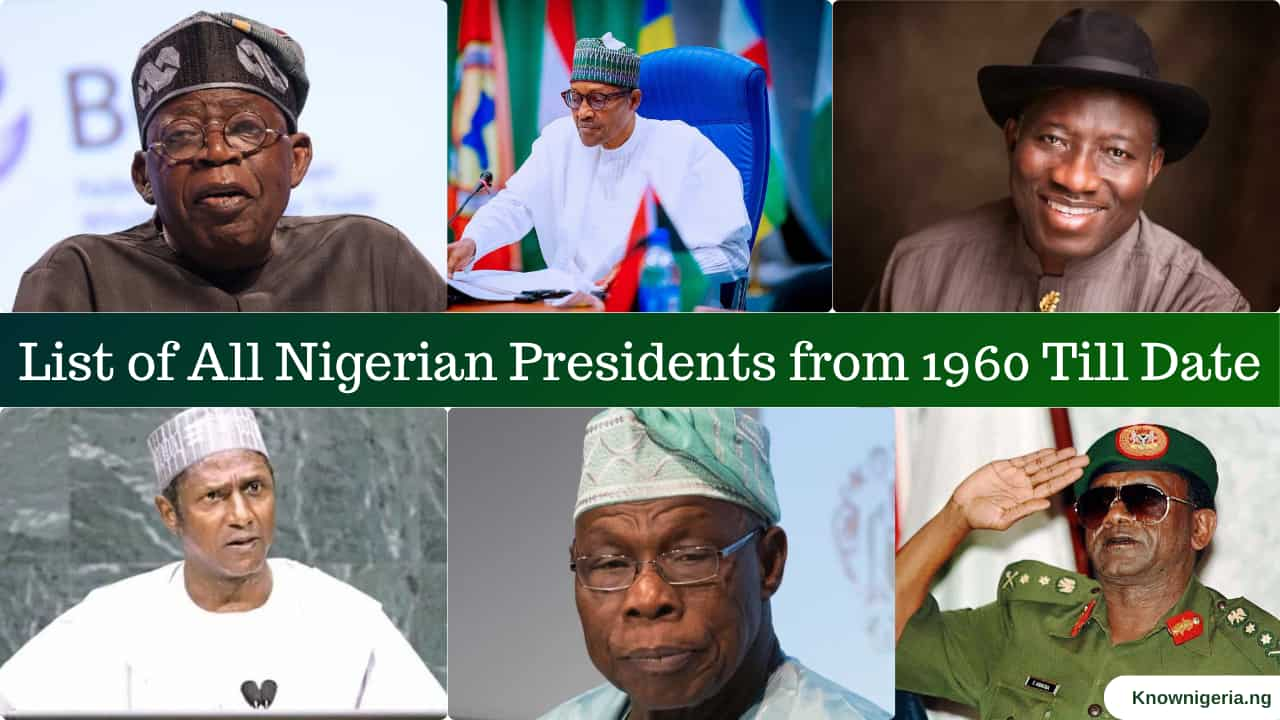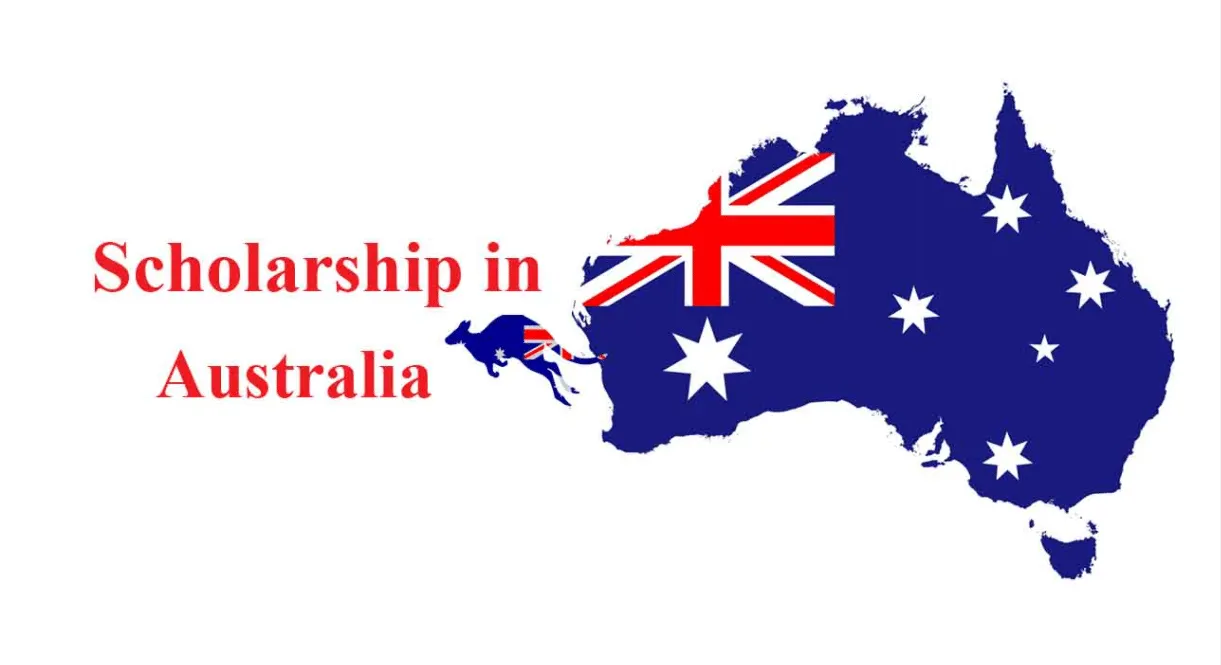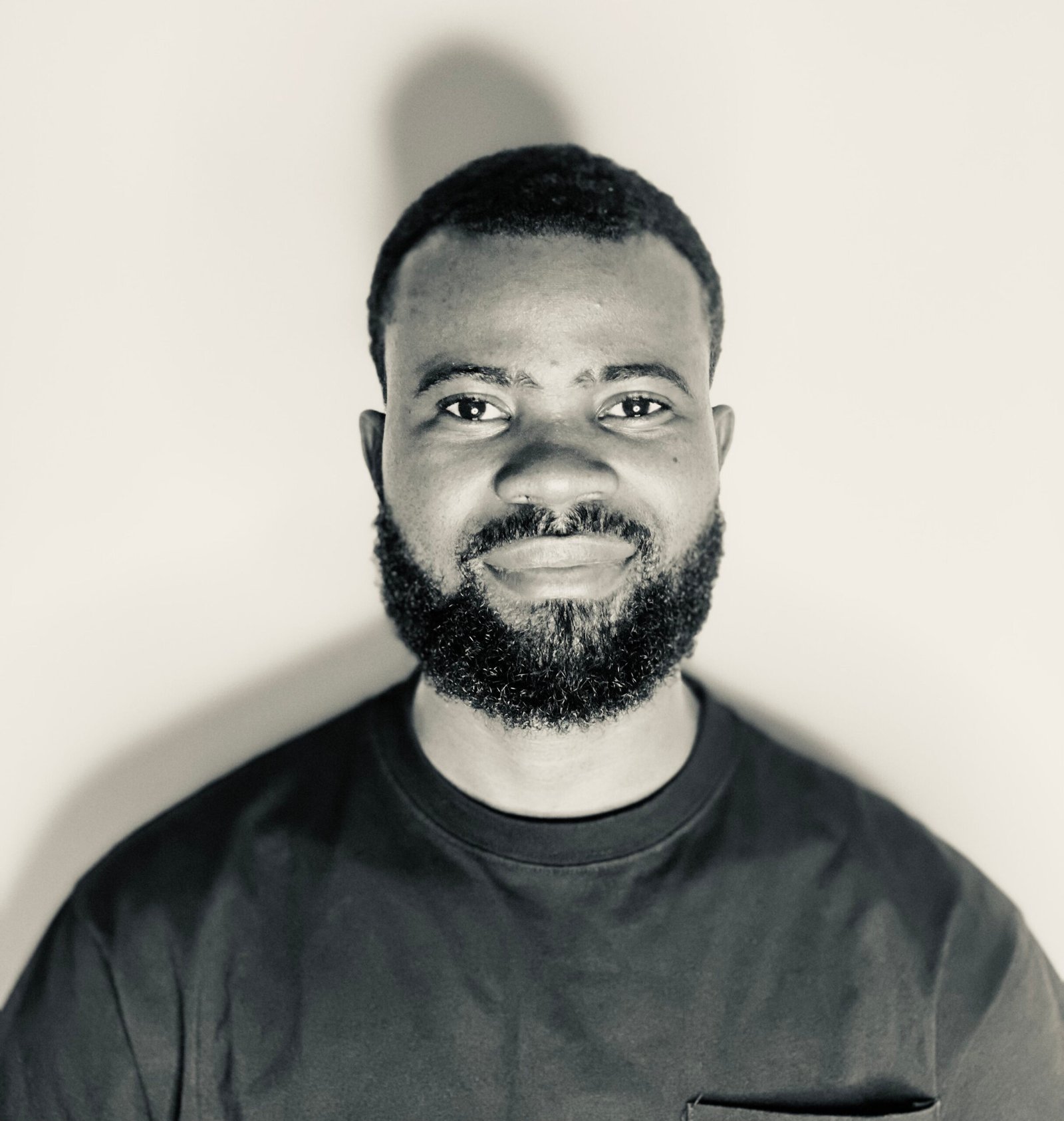Since independence in 1960, Nigeria, a nation rich in culture and diversity, has seen the leadership of numerous people.
Nigeria, sometimes known as the “Giant of Africa,” has a long history of strong leadership that has influenced the course of the country since its independence in 1960.
The President is the most powerful and responsible person in the country, influencing the history of the country.
Every president in Nigeria’s history, from military dictators to democratically elected ones, has had a distinct influence on the country’s political climate.
In short, one of the interesting facts about Nigeria is that every notable figure in Nigerian history, from the affable Nnamdi Azikiwe to Bola Ahmed Tinubu, has made a distinctive contribution to the country’s terrain.
Read on as we take you through a comprehensive list of all Nigerian presidents from 1960 till date and how their characters and momentous choices have shaped Nigeria’s presidential history from the beginning to the present.
Table of Contents
List of All Nigerian Presidents from 1960 Till Date
Here is a list of all the Nigerian Presidents from date down to 1960 when Nigeria got her independence:
1. President Bola Ahmed Tinubu

On May 29, 2023, President Bola Ahmed Tinubu took over office from President Muhammadu Buhari as Nigeria’s 16th and current president.
Chief Bola Ahmed Adekunle Tinubu GCFR was born on March 29, 1952, into a political family of Nigerian descent.
In the Third Republic, he served as the senator for Lagos West and as governor of Lagos State from 1999 to 2007.
2. President Muhammadu Buhari (29 May 2015 to 29 May 2022)

On May 29, 2015, President Buhari took office following his victory in the presidential contest. In 2019, he was chosen again for a second term.
Formerly, from December 1983 to August 1985, Buhari, a retired Major General in the Nigerian Army, ruled Nigeria militarily.
Efforts to address Nigeria’s economic difficulties, insecurity, and corruption have characterized his leadership.
Read Also: 15 Top Richest Politicians in Nigeria
3. Goodluck Ebele Jonathan (29 May 2010 to 29 May 2015)

Goodluck Jonathan served as President of Nigeria from 2010 to 2015. He initially assumed office as Acting President following the death of President Yar’Adua and was later elected as President in his own right.
His administration faced various challenges, including security issues, corruption allegations, and economic struggles.
Jonathan is also credited with overseeing Nigeria’s first peaceful democratic transition of power between rival parties in 2015.
4. Umaru Musa Yar’Adua (29 May 2007 to 5 May 2010)

Umaru Musa Yar’Adua was elected as the President of Nigeria in 2007. His presidency was characterized by a focus on improving infrastructure, tackling corruption, and promoting peace and stability in the Niger Delta region.
However, his tenure was cut short due to health complications, and he passed away while in office.
5. Olusegun Obasanjo (29 May 1999 to 29 May 2007)

Olusegun Obasanjo served as Nigeria’s President from 1999 to 2007, marking the return of civilian rule after years of military dictatorship.
His presidency was marked by economic reforms, including the establishment of the Economic and Financial Crimes Commission (EFCC) to combat corruption.
Obasanjo also played a significant role in regional and international diplomacy.
6. General Abdulsalami Abubakar (8 June 1998 to 29 May 1999)

Abdulsalami Abubakar assumed the position of President after the sudden death of General Sani Abacha in 1998.
He oversaw the transition to civilian rule, organizing elections that led to the emergence of a democratically elected government in Nigeria. His brief tenure is primarily remembered for his role in Nigeria’s return to civilian governance.
Read Also: Interesting Fun Facts About Nigeria
7. General Sani Abacha (17 November 1993 to 8 June 1998)

Sani Abacha seized power in a military coup in 1993 and served as Nigeria’s military ruler until he died in 1998.
His regime was characterized by authoritarian rule, human rights abuses, and allegations of widespread corruption.
Despite economic challenges during his tenure, Abacha’s regime was also marked by infrastructural development initiatives.
However, his administration’s legacy is tarnished by allegations of human rights violations and corruption.
8. General Muhammadu Buhari (31 December 1983 to 27 August 1985)

Buhari, a retired Major General in the Nigerian Army, took power through a military coup on December 31, 1983.
During his regime, he implemented strict measures to combat corruption, indiscipline, and economic mismanagement.
Buhari’s administration focused on restoring order and discipline in governance. However, criticisms arose regarding human rights abuses and the suppression of political opposition.
His government was eventually ousted in another military coup led by General Ibrahim Babangida in August 1985.
9. General Ibrahim Babangida (27 August 1985 to 26 August 1993)

Babangida, also known as IBB, took power in a coup that ousted General Buhari in August 1985.
His regime initiated a program of economic reform, known as the Structural Adjustment Program (SAP), aimed at liberalizing the economy.
However, his administration was marred by political instability, allegations of corruption, and controversial decisions, such as annulling the results of the June 12, 1993, presidential election, which is widely considered Nigeria’s freest and fairest election.
Babangida eventually resigned in August 1993 under pressure from public protests and military discontent.
Read ALSO: List Of All Oil Refineries in Nigeria
10. Ernest Shonekan (26 August 1993 to 17 November 1993)

Ernest Shonekan briefly served as the interim head of state of Nigeria between Babangida’s resignation and the military coup that brought General Sani Abacha to power.
Shonekan was appointed by Babangida to lead a transitional government but faced challenges from both civilian and military factions.
His administration lasted only three months before Abacha seized power in November 1993, effectively ending Shonekan’s brief tenure. Shonekan’s time in office was marked by political uncertainty and economic instability.
These individuals played significant roles in Nigeria’s political history, each leaving their mark on the country’s trajectory through different periods of military rule and transition to civilian governance.
11. General Murtala Mohammed (29 July 1975 to 13 February 1976)

Murtala Mohammed was a Nigerian military ruler who assumed power in a coup on July 29, 1975, following the overthrow of General Yakubu Gowon.
Mohammed’s brief tenure as head of state was marked by a focus on anti-corruption efforts, the restructuring of the Nigerian government, and plans for national development.
However, his time in office was tragically cut short when he was assassinated in an attempted coup on February 13, 1976.
Despite the brevity of his rule, Mohammed is remembered for his strong stance against corruption and commitment to reform.
12. General Obasanjo Olusegun (13 February 1976 to 1 October 1979)

Following the assassination of General Murtala Mohammed, Olusegun Obasanjo, who was the Chief of Staff,
Supreme Headquarters, assumed leadership as Nigeria’s military Head of State. Obasanjo’s administration oversaw the transition from military to civilian rule, culminating in the 1979 elections, which saw the country’s first democratic transfer of power.
Obasanjo voluntarily handed over power to a civilian government, marking the end of military rule in Nigeria at that time.
He later returned to civilian office, serving as Nigeria’s democratically elected President from 1999 to 2007, as previously mentioned.
13. President Shehu Shagari (1 October 1979 to 31 December 1983)

Shehu Shagari became Nigeria’s first democratically elected President following the transition from military to civilian rule in 1979.
His presidency was characterized by efforts to stabilize the economy and promote development, particularly in agriculture and infrastructure.
However, his administration faced challenges such as economic downturns, allegations of corruption, and political unrest.
Shagari was re-elected for a second term in 1983 but was ousted in a military coup led by General Muhammadu Buhari later that year, marking the end of Nigeria’s Second Republic.
14. General Johnson Aguiyi-Ironsi (16 January 1966 to 29 July 1966)

Johnson Aguiyi-Ironsi was a Nigerian military officer who assumed power as Nigeria’s first military Head of State following a coup d’état on January 15, 1966, which resulted in the assassination of Prime Minister Abubakar Tafawa Balewa and other political leaders.
Aguiyi-Ironsi’s administration was short-lived and marked by political turmoil, ethnic tensions, and suspicions among different regions of Nigeria.
His efforts to centralize power and unify the country faced significant resistance, particularly from the northern region.
Aguiyi-Ironsi was overthrown in a counter-coup on July 29, 1966, leading to further instability and eventually the Nigerian Civil War.
15. General Yakubu Gowon (1 August 1966 to 29 July 1975)

Yakubu Gowon became Nigeria’s Head of State following the counter-coup in July 1966 that ousted General Aguiyi-Ironsi.
Gowon’s tenure as military ruler was the longest in Nigeria’s history, spanning nearly nine years. He led the country during the Nigerian Civil War (1967-1970), also known as the Biafran War, which erupted due to ethnic tensions and regional aspirations for secession.
Gowon’s administration focused on post-war reconstruction, economic development, and national reconciliation efforts.
However, his regime faced criticism for issues such as corruption and inefficiency. Gowon was eventually overthrown in a bloodless coup led by General Murtala Mohammed in 1975.
16. Azikiwe Nnamdi (1 October 1963 to 16 January 1966)

Nnamdi Azikiwe, popularly known as “Zik of Africa,” was a prominent Nigerian nationalist and politician.
He served as the Governor-General of Nigeria from 1960 to 1963 and then as the ceremonial President of Nigeria from 1963 to 1966, after Nigeria became a republic.
Azikiwe played a significant role in Nigeria’s struggle for independence from British colonial rule. He was a founding member of the National Council of Nigeria and the Cameroons (NCNC), a leading political party advocating for Nigerian independence.
Azikiwe’s presidency ended abruptly with a military coup in January 1966, led by General Aguiyi-Ironsi.
Read Also: 14 Richest Men in Nigeria
Who is the Youngest President in Nigeria
Yakubu Gowon, aged thirty-one, became the youngest head of state when he took over following Johnson Aguiyi-Ironsi’s murder during the countercoup in July 1966.
President Goodluck Jonathan became the youngest civilian president to hold the position when Umaru Musa Yar’Adua passed away at the age of 52. At 53, he was also the youngest person to be elected to the position.
Shehu Shagari, who took office at the age of 54, was the youngest person to be elected as head of state. Meanwhile, President Muhammadu Buhari, who took office at the age of 72, was the oldest individual to hold the office of president.
Who is the Nigerian First President?
Dr. Nnamdi Azikiwe, a well-known nationalist who played a significant role in the struggle for Nigerian independence, served as the country’s first president. Known as the “Zik of Africa,” he had a significant impact on Nigeria’s political climate and helped the country make the transition from colonial to self-governance.
Unity, progress, and empowerment were at the core of Azikiwe’s vision for Nigeria, which laid the groundwork for the nation’s future growth.
Azikiwe had to deal with racial tensions and unstable economic conditions as the first president of independent Nigeria. Despite these challenges, he put out great effort to advance social changes that would better the lot of average Nigerians and foster national unity.
His impact as the first president of Nigeria is enduring, inspiring future generations to work toward creating a more prosperous and inclusive country.
FAQs
Who was the first President of Nigeria?
The first President of Nigeria was Nnamdi Azikiwe, serving from 1963 to 1966.
How many Presidents has Nigeria had since independence in 1960?
Nigeria has had a total of 15 Presidents since gaining independence in 1960.
Who is the current President of Nigeria?
The current President of Nigeria is President Bola Ahmed Tinubu, who assumed office in 2023.
How long did each Nigerian President serve in office?
The length of service varies for each President, ranging from months to several years.
Has Nigeria ever had a female President?
No, Nigeria has not yet had a female President as of the present date.
Are there any Presidents who served non-consecutive terms in Nigeria?
Yes, Olusegun Obasanjo and Muhammadu Buhari both served non-consecutive terms as Presidents of Nigeria.
Conclusion
The list of Nigerian presidents from 1960 till date reflects the country’s journey through various political transitions and challenges.
Each president has played a unique role in shaping Nigeria’s history and development. From the first president, Nnamdi Azikiwe, to the current president, Muhammadu Buhari, each leader has left their mark on the nation.
As Nigeria continues to navigate its path towards progress and stability, it is important to remember the legacy of these past leaders and learn from their successes and failures.
If you like our content, we know you would love our excellent content on our Youtube channel, Tiktok, Facebook, Instagram, and Twitter. Please subscribe and follow us for more Premium Know Nigeria content.
References
- Nigerianembassy.se- Past and present Nigerian presidents
- Nigeria-presidents.netlify.app
- Nigerianembassymalabo.org- Past and present Nigerian presidents
Recommendations
15 Top Richest Politicians in Nigeria










